Biology Books
Who doesn't like learning about some biology? Animals, evolution (of animals), and variety (of animals). Pretty much animals, with some other stuff thrown in for good measure.

Life, by Richard Fortey
Not sure how you can boil down 4+ billion years of evolution into a single book, but Fortey does a great job. I find his writing to be very soothing and relaxing as he describes long-extinct animals in forgotten environments. Definitely more of a broad overview than the other book on this list that he wrote.
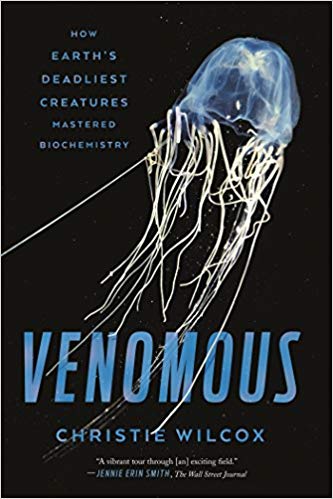
Venomous, by Christie Wilcox
It's a pretty cool book all about the animals you'd hate to run into in a dark alley, or in your shoe. I loved learning about the variety of toxins produced, how some of them are made, and the way they affect the body. She also discusses how the animals prevent the toxins from affecting themselves. There's also information on use of venoms in medical, pharmaceutical, and other applications.

Why Darwin Matters, by Michael Shermer
There are numerous pro-evolution, anti-creationist books out there, but I think this one is the most succinct, readable one I've found. Written by a former evolution-denier and one of the greatest proponents of critical thinking in the current era, it goes through many of the arguments made by creationists and the flaws within. He demonstrates why intelligent design is misusing scientific principles for its own means, and most importantly, why there is no controversy between evolution and creationism. Evolution is true, and that's all that matters. The most important part of this book is that it is written in a non-threatening fashion, in order to help people understand instead of pushing them away. Although not the first book I've read on evolution, it's definitely one of my favorites.
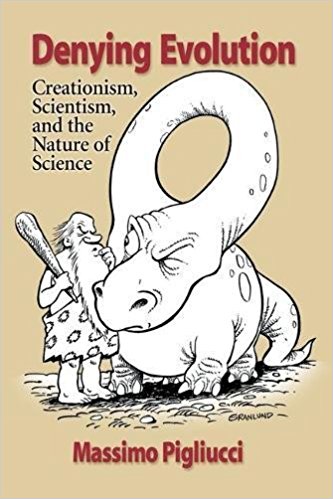
Denying Evolution, by Massimo Pigliucci
Pigliucci knows how to take the usual arguments against creationist and turn them on their heads. This book is not just about pointing out the fallacies of the creationists, but showing how those teaching evolution can do a better job to teach and explain the science behind evolution. He also spends part of the book describing common arguments made by creationists and exposes the flaws in each of them. Although written at a higher level than Shermer's book, Pigliucci also makes excellent points about what needs to be done to educate the public on the importance of evolution and the need for better science education

Evolution, by Carl Zimmer
If you want to learn about evolution, you need to start somewhere! Carl Zimmer is a popular science writer and does a masterful job of explaining the main theory of evolution. He goes into multiple examples of how evolution has worked through the eons, and makes it easy to understand. I read this in high school, and although I cannot recall many more details (my apologies), this is a great place to start if you're going to start somewhere.

Parasite Rex, by Carl Zimmer
When one thinks of parasites, one usually recoils in horror and disgust. But in terms of evolution, parasites are a stroke of genius. Parasites are some of evolution's finest works, able to survive in a myriad of ways at the expense of other species. Carl Zimmer also wrote this book, in which he delves into the fascinating world of parasites. Much of the book discusses different examples, both of human and non-human parasites. There is the barnacle that castrates the male crab and forces it to care for the barnacle's eggs, as if it were a female crab. There's the worm (I believe) that invades an ant's brain, causing it to stand at the tops of grass, where it will be most likely eaten by a cow and the worm passed to the next stage of its life cycle. There is even Toxoplasma gondii, which causes rats to be attracted to cat urine, so that they are more likely to be eaten. You will be constantly amazed by the plethora of parasites which share the world with us!
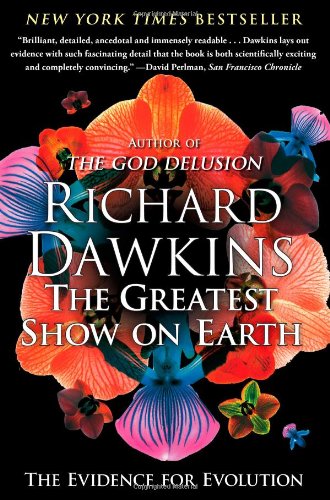
The Greatest Show On Earth, by Richard Dawkins
If you're a creationist, you DO NOT want to mess with Richard Dawkins. He is an outspoken evolutionary biologist, a staunch atheist, and an extremely adamant opponent of intelligent design. In this book, Dawkins laments the increased support for creationism in today's society, and refutes many of the creationist arguments with in-your-face logic. He utilizes countless examples, from antibiotic resistance to the vast fossil record. My personal favorite example is the vagus nerve of the giraffe. The nerve stretches all the way down the neck from the brain, loops under the aorta, and then stretches all the way back up to the head. If the giraffe had been intelligently designed, this would not happen; however, evolution does not occur with a guided hand. This, among other examples, will show you why evolution is fact and not fiction.

The Ancestor's Tale, by Richard Dawkins and Yan Wong
The Canterbury Tales are about a group of travelers, and each part tells a different story from each of the travelers. Dawkins takes this concept and uses it to trace backwards through the evolutionary tree, telling the story of the different branches as they join with the slim twig of humankind. He travels back through time, telling the stories of primates, fishes, fungi, and even bacteria. He uses each group to discuss something about evolution, genetics, taxonomy, or human existence. There are stories about well-known groups, and those few people have heard of outside of their college biology classes. I really enjoyed this book because it's a different style than most other Dawkins books. Instead of merely describing each unique group, he uses them as a jumping off point to explore the diversity and beauty of life, as well as the connections between seemingly-disconnected organisms. Although this book was thick, it was definitely a good read.
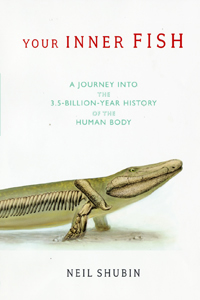
Your Inner Fish, by Neil Shubin
This is a more recent book along the same lines as "Why We Get Sick." Neil Shubin is a paleontologist, and writes this book from a greater evolutionary perspective. He looks at the similarities between humans and other species, discussing the genetic and physiological differences between the groups. He discusses medical conditions, such as why humans have such a propensity towards lower back conditions. This book is a great look at the human species from a broader evolutionary perspective, and is quite the complement to the entry above.

Aquagenesis, by Richard Ellis
What sorts of organisms have lived in the oceans? Richard Ellis has the answer. This book combines two of my favorite subjects, evolution and marine biology. Ellis discusses the many groups of organisms that have lived in the sea, from tiny bacteria to humans (check out the aquatic ape hypothesis). Along the way, he explains how different features of each group developed, such as bioluminescence. I enjoyed this book mainly for his discussion of different species, both alive and fossilized. For each group, he talks about the species found in the fossil record, which gives you a great perspective as to how life in the oceans has changed over time. If you're looking for a book that talks about extinct whales, plants, and everything in between, this is your book!
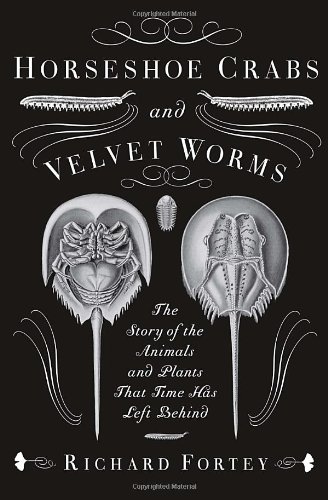
Horseshoe Crabs and Velvet Worms, by Richard Fortey
As of this writing, I am currently in the process of finishing this book. Fortey is an expert on trilobites, and has years of experience is the realm of paleontology and evolutionary biology. In this book, he discusses many different living species that have not changed much through time; one might call them "living fossils." I have really enjoyed it so far, because he not only focuses on well known organisms, such as the Coelacanth, but on other species, such as the Gingko tree and bacterial stromatolites. The writing does take a little bit of getting used to, and the book can be fast paced, but I enjoy the way Fortey writes, with a dry, British sense of humor. If you're looking to expand your knowledge of "living fossils," this is the book for you!